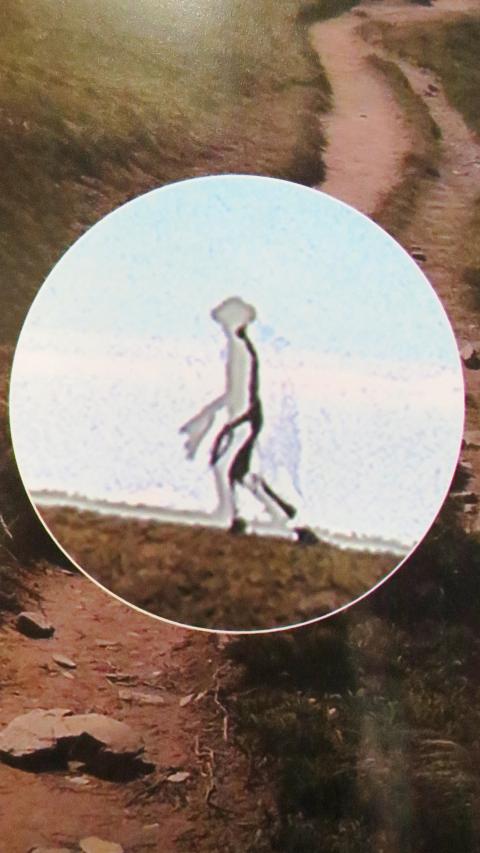A local UFO association has released a photograph taken at a high mountain lake which it says shows the image of an “alien being,” but skeptics say it may be a digitally edited or multiple-exposure photo.
The Taiwan UFOlogy Society (TUFOS) announced on Saturday that a photograph taken by a policeman at Jiaming Lake (嘉明湖) — located at an altitude of 3,310m on the southern section of the Central Mountains in Taitung County — shows what appears to be a large alien creature, with a transparent body and webbed hands, walking in the distance.
Due to its strange features, TUFOS executives say it does not look like a human being, but must have come from outer space.

Photo courtesy of the Taiwan Ufology Society
TUFOS chairman Huang Chao-ming (黃朝明) said the policeman gave them the photo, which was taken on his iPhone 4 mobile phone, for examination.
A close-up image of the so-called “alien being” shows double-exposure lines at the bottom. To determine whether the photo is genuine, TUFOS spent a year having experts on mobile phone technology, computer imagery and camera photography inspect the photo, but it has yet to make a conclusive finding.

Photo courtesy of the Taiwan Ufology Society
Some experts have said it may be a leftover image from the mobile phone’s flash memory that was superimposed on the scenery shot.
Huang said if it was a faulty superimposed image, why did the “alien being” just happen to be at the top of the mountain ridge line?
The photograph was taken by Chen Yung-huang (陳詠鍠), a policeman who went on a hiking trip to Jiaming Lake with his colleagues on May 14 last year.
Chen told Huang that he did not notice anything unusual, and only discovered the strange figure in the picture after coming down the mountains.
Chien Jung-tai (簡榮泰), an expert on photo image processing, was shown the photograph on Saturday. Chien initially said that a shaking motion when the shot was being taken might have produced the double lines in what might be a leftover image.
However, it was interesting to see that the double lines in the leftover image appear only in a small section of the photo, he said.
Chien also compared the pixel elements of the double lines below the “alien being” and the image above it, and said they do not differ much, adding that it does not appear to be an edited photo.
However, he said that if it were an “alien being,” then it should have a body structure and composition different from that of a human being.
Judging from the photo, the creature appears to have a huge body, but if it is transparent, it would not have an outline and a shadow, he said.
“If it was an alien being from another planet, with its own special biological structure, then we would be unable to interpret its shape and appearance, based on what we see from creatures on Earth,” he said.
When asked if the image might be caused by a superimposition of a leftover frame image from the mobile phone’s flash memory, Chien said that was a question that can only be answered by experts in optical imaging technology for flash memory devices.
Based on his experience with digital cameras and mobile phones, he said the probability of having a multiple-exposure image superimposed at just the right place in an outdoor scenery picture was low.
Huang said there have been reports from other countries of cameras capturing images of beings and objects that are invisible to the human eye.
He said TUFOS is planning to send the photo abroad for detailed examination, and it will seek the assistance of international UFO experts and organizations on the matter.

‘DENIAL DEFENSE’: The US would increase its military presence with uncrewed ships, and submarines, while boosting defense in the Indo-Pacific, a Pete Hegseth memo said The US is reorienting its military strategy to focus primarily on deterring a potential Chinese invasion of Taiwan, a memo signed by US Secretary of Defense Pete Hegseth showed. The memo also called on Taiwan to increase its defense spending. The document, known as the “Interim National Defense Strategic Guidance,” was distributed this month and detailed the national defense plans of US President Donald Trump’s administration, an article in the Washington Post said on Saturday. It outlines how the US can prepare for a potential war with China and defend itself from threats in the “near abroad,” including Greenland and the Panama

A wild live dugong was found in Taiwan for the first time in 88 years, after it was accidentally caught by a fisher’s net on Tuesday in Yilan County’s Fenniaolin (粉鳥林). This is the first sighting of the species in Taiwan since 1937, having already been considered “extinct” in the country and considered as “vulnerable” by the International Union for Conservation of Nature. A fisher surnamed Chen (陳) went to Fenniaolin to collect the fish in his netting, but instead caught a 3m long, 500kg dugong. The fisher released the animal back into the wild, not realizing it was an endangered species at

The High Prosecutors’ Office yesterday withdrew an appeal against the acquittal of a former bank manager 22 years after his death, marking Taiwan’s first instance of prosecutors rendering posthumous justice to a wrongfully convicted defendant. Chu Ching-en (諸慶恩) — formerly a manager at the Taipei branch of BNP Paribas — was in 1999 accused by Weng Mao-chung (翁茂鍾), then-president of Chia Her Industrial Co, of forging a request for a fixed deposit of US$10 million by I-Hwa Industrial Co, a subsidiary of Chia Her, which was used as collateral. Chu was ruled not guilty in the first trial, but was found guilty

The Chinese Nationalist Party (KMT) is maintaining close ties with Beijing, the Democratic Progressive Party (DPP) said yesterday, hours after a new round of Chinese military drills in the Taiwan Strait began. Political parties in a democracy have a responsibility to be loyal to the nation and defend its sovereignty, DPP spokesman Justin Wu (吳崢) told a news conference in Taipei. His comments came hours after Beijing announced via Chinese state media that the Chinese People’s Liberation Army’s Eastern Theater Command was holding large-scale drills simulating a multi-pronged attack on Taiwan. Contrary to the KMT’s claims that it is staunchly anti-communist, KMT Deputy